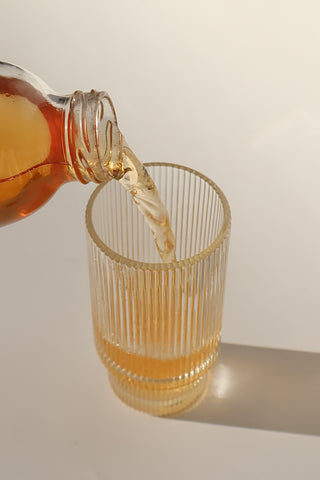Are you ready to master the art of brewing kombucha at home? Join the growing number of UK home brewers crafting their own delicious and healthy kombucha by ensuring you don't make these common mistakes, put together by a self taught kombucha connoisseur who now teaches beginners, both online and in-person on how very busy people can brew in the easiest way possible.
If you're looking for a guide on how to brew kombucha at home, we have complete guide for beginners available here.
We also have a blog on growing your own SCOBY from a bottle of live kombucha available here ... be sure to take a look at the wonder that is the SCOBY too!
If you're looking for a brewing workshop, check out the current events we have available here, and if you'd be interested in booking your own, we tailor all our events to your needs, email us at guru@boochacha.co.uk.
While brewing kombucha is a rewarding experience, it's not without its challenges.
To help you on your fermentation journey, we've compiled a list of the most common mistakes to avoid.
Whether you're in London, Edinburgh, or anywhere in between, steer clear of these pitfalls to ensure your home-brewed kombucha is nothing short of spectacular.

1. Using the Wrong Type of Tea
One of the most crucial ingredients in kombucha brewing is the tea itself. Novice brewers often make the mistake of using herbal or certain flavoured teas, which can inhibit SCOBY growth or introduce unwanted bacteria. Make sure a portion of the tea used for brewing is always black, green, or white as these teas have the right nutrients for the SCOBY. Remember, the quality of your UK-sourced tea can make or break your brew!
2. Neglecting Sanitation
Proper sanitation is paramount when brewing kombucha. Any contamination can spoil your batch and harm your SCOBY. Options to ensure equipment is cleaned correctly are either hot water and vinegar or hot water and soap, but it is extremely important to ensure that all soap residue is removed before use, as it can cause harm to your baby SCOBY. Keep your brewing area clean, your hands well-washed and remove your jewellery to create a safe environment for your kombucha to thrive.
3. Incorrect Sugar Balance
Sugar isn't just for sweetness—it's the fuel for the fermentation process. Using too little can starve your SCOBY, while too much can lead to overly sweet kombucha or even mould growth. Use the right amount of sugar, as specified in your kombucha recipe, and opt for high-quality cane sugar to keep your SCOBY happy and your kombucha perfectly balanced.
4. Inadequate Fermentation Time
Patience is a virtue, especially in kombucha brewing. Rushing the fermentation process can result in a drink that's too sweet or lacking in probiotic goodness. On the other hand, fermenting for too long can create an overly sour taste. Monitor the taste of your kombucha every few days, and find the sweet spot that suits your palate.
The biggest factor in determining your kombuchas fermentation time is temperature. The ideal range is 20-25°C. Being consistently in this range should produce batches of kombucha in 7 - 10 days. Another big factor is the ratio of starter liquid to sweet tea, as a rule of thumb, keep the starter liquid at 20% of the total liquid and you won't have any problems!
P.s. Starter liquid is just kombucha left over from the previous batch!
5. Improper Storage Conditions
Temperature and light can significantly impact your kombucha's fermentation. Keep your brewing vessel in a warm spot, ideally between 20-25°C, and away from direct sunlight.
An airing cupboard can be the perfect home for a kombucha brew!
If your home is on the cooler side, consider a heating mat to maintain a consistent temperature. And remember, your SCOBY doesn't like to be disturbed, so find a quiet corner where your kombucha is safe from knocks and wobbles, and can ferment in peace.

Conclusion:
By avoiding these common mistakes, you'll be well on your way to brewing perfect kombucha in your UK home. Remember, every batch is a learning experience, so don't be discouraged by the occasional misstep.
The first batch is never the best, as the SCOBY has to "wake up" from its dormant state. Once you have that new layer forming over the top of the liquid, your kombucha will ferment with much more power, it will ferment quicker and start to develop a light fizz, due to the natural carbon dioxide being produced and then trapped in the liquid by this solid layer.
With a bit of practice and attention to detail, you'll soon be sipping your own superbly crafted kombucha. Cheers to your brewing success!
Ready to start your home-brewing adventure with confidence? Check out our top-rated kombucha starter kits and frequently asked questions. Happy brewing!


